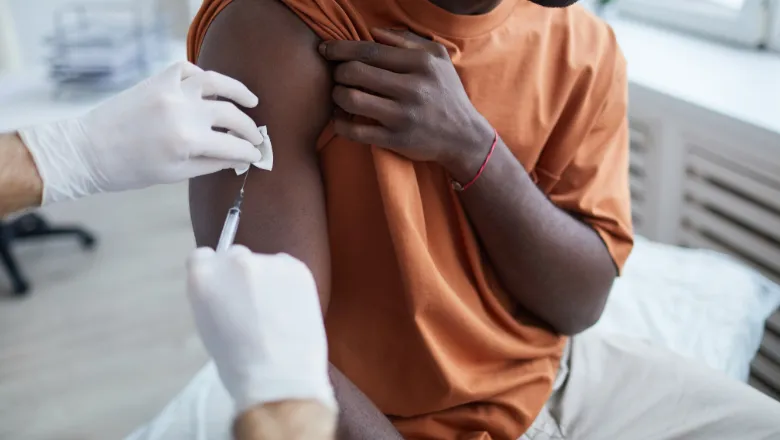Vaccine hesitancy puts the blame on individuals, instead of addressing the historical and ongoing racism that has contributed to the societal inequities that lead to ethnic inequalities in the distribution and uptake of vaccines.
Laia Bécares, Professor of Social Science and Health
15 December 2022
Racism is 'fundamental cause' of COVID-19 vaccine hesitancy among ethnic minorities
King's academic leads newly published briefing from the Runnymede Trust and the Centre on the Dynamics of Ethnicity

Racism is the ‘fundamental cause’ of COVID-19 vaccination hesitancy among ethnic minority groups, according to a newly published briefing from the Runnymede Trust and the Centre on the Dynamics of Ethnicity, led by Professor of Social Science and Health Laia Bécares from King's School of Global Affairs.
The briefing details that during the rollout of the COVID-19 vaccination programme in the UK, explanations for the lower vaccination rates in people from ethnic minority groups focused on differences in the level of concern about side effects and in a lack of trust in the development and efficacy of the vaccine.
The authors of the new briefing argue that by the time people were deciding whether to have the vaccine, the conditions that created lower vaccination uptake among ethnic minority groups were already present. By ignoring the impact of structural and institutional racism on vaccination rates, ‘vaccine hesitancy’ is misunderstood – and crucially, the opportunity to address inequities is missed.
The briefing uses data from the UK Household Longitudinal Study to show that institutional and community-level factors, driven by structural and institutional racism explain the large majority of ethnic inequities in vaccination rates.
Vaccination hesitancy rates vary across ethnic groups, with over half of the Black group reporting hesitance to get the Covid vaccine, compared with just over 10% of the White British group. When comparing vaccine hesitancy in the ethnic minority groups with the White British group, institutional factors - including financial situation, car use, ability to travel to vaccination centres, housing tenure, and educational attainment - explain 41.6% of the difference for Pakistani or Bangladeshi people, while community-level factors including neighbourhood diversity, cohesion, political efficacy and racism explain over 30%.For Black people, community-level factors were the biggest impact, with institutional-level factors explaining 12.9% of the difference.
These findings suggest that if policy intervened on institutional and community-level factors – shaped by structural and institutional racism – considerable success in reducing ethnic inequities might be achieved.
Professor Laia Bécares was the lead author of the briefing, alongside Professor James Nazroo and Dr Patricia Irizar of The University of Manchester and Dr Richard Shaw of the University of Glasgow.
It draws on a longer article published in SSM – Population Health, and is part of a series of briefings by the Runnymede Trust and the Centre on the Dynamics of Ethnicity (CoDE) on the impact of COVID-19 on people from ethnic minority groups.
While this study focused on COVID-19 vaccinations specifically, structural and institutional racism in the UK is a systemic and ongoing issue that needs to be addressed as a long-term strategy, including recognising the role of racism as a fundamental cause of ethnic inequities in health. Recognising and addressing racism will result in effective reductions of ethnic inequalities relevant to health and social issues, including the current cost-of-living crisis.
Professor Laia Bécares
